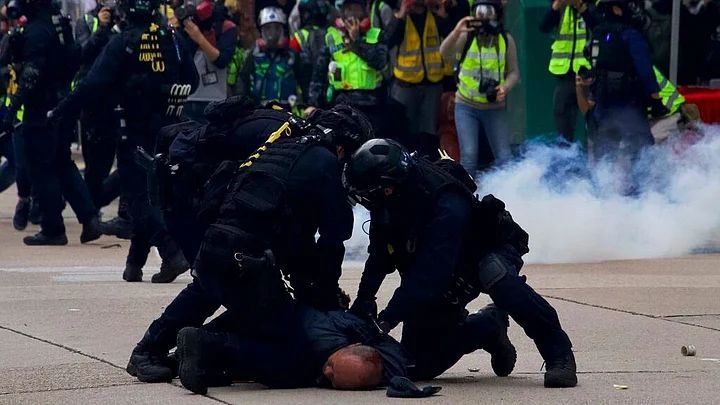Clashes broke out between protesters and police in Hong Kong on Sunday, 19 January, cutting short a rally after thousands had gathered at a park to call for electoral reforms and a boycott of the Chinese Communist Party.
Police fired tear gas near the park, known as Chater Garden, after some protesters attacked plainclothes officers — a return to the violence that has roiled the Chinese territory off and on for months.
Sporting their movement's trademark black clothing and face masks, rally participants had earlier packed into Chater Garden, located near the city's Legislative Council building. They held up signs that read “Free Hong Kong" and waved American and British flags.
“We want real universal suffrage," the protesters chanted. “Disband the police force, free Hong Kong!"
‘Hong Kong Is Not World’s Focus Anymore’
Hong Kong media outlets reported that police arrested the rally's organizer, Ventus Lau, shortly after he spoke to reporters.
Local broadcaster RTHK cited fellow organizers as saying that Lau was arrested for allegedly violating the police's conditions for the rally.
Earlier in the day, Lau said he believes more large-scale protests are needed for global attention to return to Hong Kong, with the protest movement losing some of its momentum in recent weeks.
“I think Hong Kong has not been the focus of the world anymore," he said.
He urged other countries to launch sanctions against Hong Kong’s government if it does not allow residents to directly elect Legislative Council members this year.
A former British colony, Hong Kong was returned to China in 1997. While the framework of “one country, two systems" promises the city greater democratic rights than are afforded to the mainland, protesters say their freedoms have been steadily eroding under Chinese President Xi Jinping.
Frictions between democracy-minded Hong Kongers and the Communist Party-ruled central government in Beijing came to a head last June, when proposed extradition legislation sparked months of mass demonstrations.
The bill — which would have allowed Hong Kong residents to be sent to mainland China to stand trial — has since been withdrawn, but protests have continued for more than seven months, centered around demands for voting rights and an independent inquiry into police conduct.
While the protests began peacefully, they increasingly descended into violence after demonstrators became frustrated with the government's response. They feel that Hong Kong leader Carrie Lam has ignored their demands and used the police to suppress them.
In response to Sunday's rally, Hong Kong's government released a statement that warned against any foreign involvement. Beijing has repeatedly accused foreign countries like the US of inciting riots in Hong Kong in a bid to sabotage China's development.
The statement outlined the “universal suffrage of ‘one person, one vote' as an ultimate aim" enshrined in the city's de facto constitution, known as the Basic Law. This step must be implemented in line with “gradual and orderly progress," the statement said.
Underpinning the protests is a deep distrust for the central government and Xi, who is widely considered China's most authoritarian leader in decades. Some protesters have accused Lam of being “Beijing's puppet," a label she has rejected.
Demonstrators have routinely thrown bricks and gasoline bombs at riot police, who have responded with tear gas, rubber bullets and — on rare occasions — live rounds.
The months of unrest have sent the financial hub's economy reeling, as shops have shuttered during clashes and tourists have stayed away.
Hong Kong police gave approval for Sunday's rally, but not for a march that organizers had also planned. The march didn't happen, and the protest was curtailed by clashes after police ordered an end to the rally hours before the pre-approved finishing time.
Protesters used bricks, umbrellas and traffic barriers to barricade a road. They ran for cover after riot police appeared around Chater Garden and raised yellow warning flags, telling demonstrators that they should disperse because they were participating in an illegal assembly.
Two officers were bleeding from the head after a group of “rioters” attacked them with wooden sticks, police said in a statement, adding that some also lobbed water bottles and other objects at law enforcement. Others threw paint bombs at buildings in the Central business district, according to police.
Several young protesters were handcuffed outside the park, as officers made arrests and conducted searches into the evening. One man who refused to be searched retreated into a public restroom that was promptly surrounded by riot police.
(At The Quint, we question everything. Play an active role in shaping our journalism by becoming a member today.)
